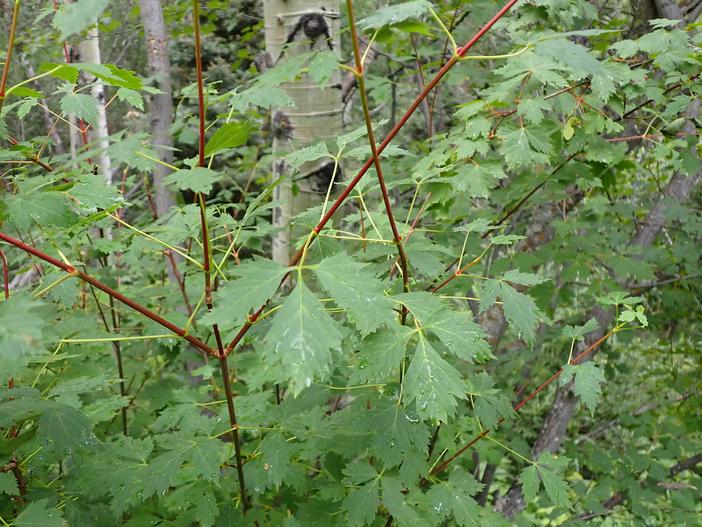Douglas Maple
(Acer glabrum var. douglasii)
Douglas Maple (Acer glabrum var. douglasii)
/
/

Matt Lavin
CC BY-SA 2.0
Image By:
Matt Lavin
Recorded By:
Copyright:
CC BY-SA 2.0
Copyright Notice:
Photo by: Matt Lavin | License Type: CC BY-SA 2.0 | License URL: https://creativecommons.org/licenses/by-sa/2.0/ | Uploader: Matt Lavin | Publisher: Flickr

























Estimated Native Range
Summary
Acer glabrum var. douglasii, commonly known as Douglas Maple, is a deciduous shrub or small tree native to mountainous regions, forest edges, and stream banks in western North America, including the Rocky Mountains and Pacific Northwest. It typically grows to a height of up to 20 feet with a similar spread, and it features a multi-stemmed, rounded form. The leaves are 2 to 5 inches wide with three to five lobes and turn vibrant shades of red and orange in the fall, providing excellent autumn color. The smooth, gray bark is another distinctive characteristic.
Douglas Maple is valued for its adaptability to a range of conditions, including its ability to grow in moist, well-drained soils and its preference for partial shade, though it can also tolerate full sun in cooler climates. It is often used in naturalistic plantings, as a component of mixed shrub borders, and for erosion control on slopes. While it is relatively low-maintenance, it may require additional water during dry periods. It is not commonly afflicted by serious pests or diseases, but leaf scorch can occur in hot, dry conditions. This species is less commonly cultivated than other maples, but its smaller size and attractive fall color make it a good choice for residential gardens where space is limited.CC BY-SA 4.0
Douglas Maple is valued for its adaptability to a range of conditions, including its ability to grow in moist, well-drained soils and its preference for partial shade, though it can also tolerate full sun in cooler climates. It is often used in naturalistic plantings, as a component of mixed shrub borders, and for erosion control on slopes. While it is relatively low-maintenance, it may require additional water during dry periods. It is not commonly afflicted by serious pests or diseases, but leaf scorch can occur in hot, dry conditions. This species is less commonly cultivated than other maples, but its smaller size and attractive fall color make it a good choice for residential gardens where space is limited.CC BY-SA 4.0
Plant Description
- Plant Type: Shrub, Tree
- Height: 10-25 feet
- Width: 10-20 feet
- Growth Rate: Moderate
- Flower Color: N/A
- Flowering Season: Spring
- Leaf Retention: Deciduous
Growth Requirements
- Sun: Full Sun, Part Shade
- Water: Medium
- Drainage: Fast, Medium
Common Uses
Bird Garden, Border Plant, Deer Resistant, Erosion Control, Low Maintenance, Water Garden
Natural Habitat
Mountainous regions, forest edges, and stream banks in western North America
Other Names
Common Names: Rocky Mountain Maple
Scientific Names: , Acer glabrum var. douglasii, Acer douglasii, Acer glabrum subsp. douglasii, Acer glabrum var. douglasii, Acer subserratum,
GBIF Accepted Name: